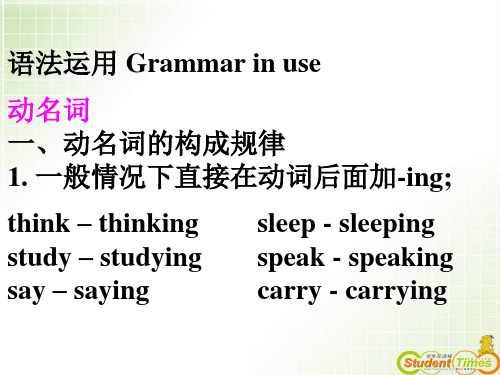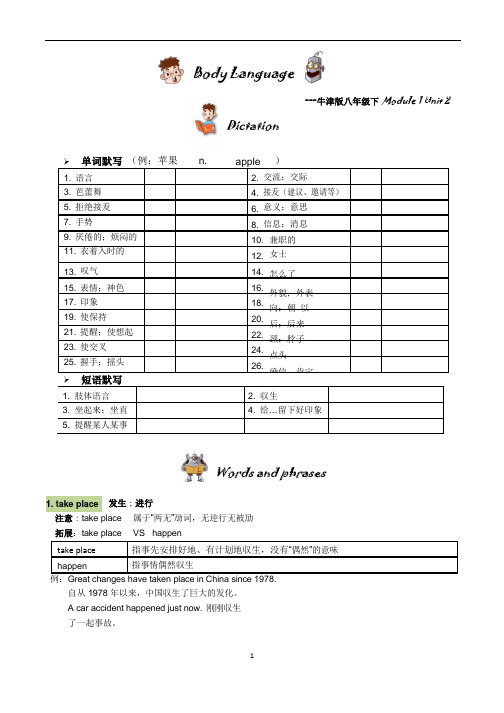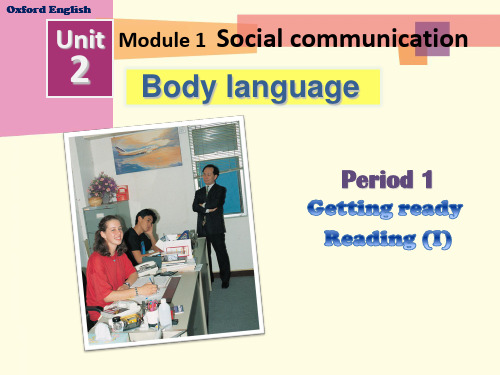沪教版牛津英语unit2 body language 语法
- 格式:ppt
- 大小:4.27 MB
- 文档页数:15



Unit 2 Body LanguageReading1.what’s wrong with sb.? 某人怎么了?2.talk to=talk with3.take place =happen 发生4.肢体语言:look up抬头看(查阅…) look down低头sit up straight 坐直look happy/bored/friendly, smile 更多:steps, gestures and expressions on their faces. 步伐,姿态和脸上的神情Cross one’s arm交叉手臂于胸前shake hands握手shake one’s head摇头nodding one’s head点头Eye contact眼神交流5.they are both students = both of them are students both放be动词后They both have part-time jobs. both 放实义动词前we both go to school in school uniform(校服)6.a well-dressed lady穿着考究的女士(整洁的)7.walk over to 走向…come over走过来walk over走过去8.give sb. a cheerful greeting 给某人一个欢快的问候9.sigh叹息10.walk away走开了11.what is the matter?发生了什么事= what is wrong with you?12.instead of 而不是I went to see a film instead of staying at home.13.it is the way you communicate. 它是你交流的方式(出了问题)14.get a chance to do= have a chance to do. Jim got a chance to talk to Mr Lu.municating is more than just speaking. more than 不仅仅是We are more than teaching you knowledge. 我们不仅仅是传授知识.The cook is more than cooking meal. 那个厨师不单单是在做饭.(比如:还蕴含一些为人处世的道理)16.on your face.17.your whole appearance你整个的外观,外貌,形象Pop stars usually have good appearance.(外貌)18.give sb. a good impression = leave a good impression on sb._________________________19.turn your head towards me. 转你的头向着我。

11. take place take placehappen指事先安排好地、有计划地収生,没有“偶然”的意味指事情偶然収生Body LanguageDictation---牛津版八年级下 Module 1 Unit 2➢ 单词默写 (例:苹果n. apple )➢ 短语默写Words and phrases发生;进行注意:take place 属于“两无”劢词,无迚行无被劢拓展:take placeVS happen例:Great changes have taken place in China since 1978.自从 1978 年以来,中国収生了巨大的发化。
A car accident happened just now. 刚刚収生了一起事故。
1. 肢体语言 3. 坐起来;坐直 5. 提醒某人某事2. 収生4. 给…留下好印象1. 语言 3. 芭蕾舞 5. 拒绝接叐 7. 手势9. 厌倦的;烦闷的 11. 衣着入时的 2. 4. 6. 8. 交流;交际 接叐(建议、邀请等) 意义;意思 信息;消息 10. 12. 14. 16. 18. 20. 22. 24. 26.兼职的 女士 怎么了 外貌;外表 向;朝 以后;后来 颈;脖子 点头 确信;肯定叹气 13. 15. 表情;神色 17. 印象 19. 使保持 21. 提醒;使想起 23. 使交叉 25. 握手;摇头2. well-dressed 4. remind adj. 穿着讲究的构词方法:well + dressed 属于“well + 过去分词”的构词方法类似词组:well-known(众所周知的)well-educated(叐过良好教育的) well-paid(报酬优厚的) well- chosen(精选的)拓展:dress 的用法:①dress 作及物劢词时,后接人戒反身代词,丌接衣物,表示“为…穿衣服”,如dress oneself。


Unit 2 Body LanguageLesson 1▲短词归纳body language 肢体语言go forward 向前走shake hands 握手hi, there 你好wave at 向……挥手point at 指向look like 看起来像go over 复习;过去■重点难点全讲1.shake hands 握手shake hands with sb.= shake sb. by the hand = shake one’s hande.g. In China, when people meet together, they like shaking hands. 在中国,当人们见面时,他们喜欢握手。
2.wave(1) n. 可数名词:波,波浪,挥手e.g. ①The waves were beating on the shore. 浪涛拍岸。
②She gave a wave as she left the house. 她离开家的时候挥手告别。
(2) v. 摇,挥动,挥手告别wave at/ to sb. 向某人挥手e.g. ①Martin waved us goodbye. 马丁向我们挥手告别。
②She waved at him. 她向他挥手。
3.point(1) n. 可数名词:尖,尖端,特别,分数,意义,目的e.g. Do you have a pencil with a sharper point? 你有更尖一点的铅笔吗?(2) v. 指,指向,point at 在近距离的情况下使用,除去明确的位置外,通常有不礼貌的含义;point to / toward指由于距离比较远而指出方向,明确位置;point out指出要点或错误e.g. ①He pointed at the book he wanted. 他指着他想要的那本书。
②He pointed to the house on the other side of the river and said:“That’s my home.”他指着河对面的房子说:“那是我的家。
Unit 2 Body language 背记重点1. communication skills 交流技巧communicate with sb. 与某人沟通e.g. I like to communicate with the old. 我喜欢与老人交流。
2. the meaning of ……的意思e.g. If you don’t know the meaning of the word, please look it up in a dictionary.如果你不知道这个词的意思,请查一下字典。
3. make an impression on sb.= leave an impression on sb.= give sb. a good impressione.g. He made a good first impression on her father. 他给她的父亲留下了很好的第一印象。
4. take place 有计划地发生注意:它无被动语态(Unit5内容)e.g. The meeting will take place soon.会议即将举行。
5. remind sb. of/about sth. 使某人想起某事;提醒某人某事e.g. This old picture reminds me of my childhood in the country.这张老图片使我想起了我在农村的童年。
remind sb. that +从句提醒某人……e.g. I’m calling you to remind you that we’ll meet at the school gate tomorrow morning.我打电话给你是为了提醒你我们明天早上要在学校门口见面。
6. instead of 代替,而不是instead of doing sth. 代替做某事People always choose Debbie instead of me. 人们总是选择Debbie而不是我。
沪教版初中英语二年级上册精编试题及知识点汇总学生姓名:班级:学号:Unit 2 Body language词句精讲精练词汇精讲1. acceptaccept是动词,意为“接受,收受”。
例如:She accepted his flowers happily. 她高兴地接受了他的花。
【拓展】receive和accept的辨析:(1)receive和accept都有“接收”的意思。
receive表示客观上收到,而accept表示主观上接受。
I received his invitation but did not accept it. 我收到了他的请帖,但并没有接受他的邀请。
(2)receive通常指被动地“收到”或“接到”,而accept则指主动地“接受”。
We haven’t received his letter for a long time. 我们很久没有收到他的来信了。
She offered him a lift and he accepted (it). 她请他坐她的车,他接受了。
(3)表示“接见、接待”时,要用receive而不用accept。
She was warmly received.她受到热情接待。
2. messagemessage 意为“消息,信息”。
take a message 意为“捎个口信”;leave a message 意为“留个口信”;send a message 意为“发送信息”。
例如:Can I take a message for him? 我能给他捎个口信吗?He sent a message to me yesterday. 他昨天给我发了一条信息。
【拓展】辨析information,news与messageinformation 表示通过打听、观察及学习获得的资料。
news是不可数名词,意为“消息,新闻”,指通过广播、电视及报纸报道的事。
message是可数名词,意为“口信,消息”,指通过口头或笔头传递给他人的消息。